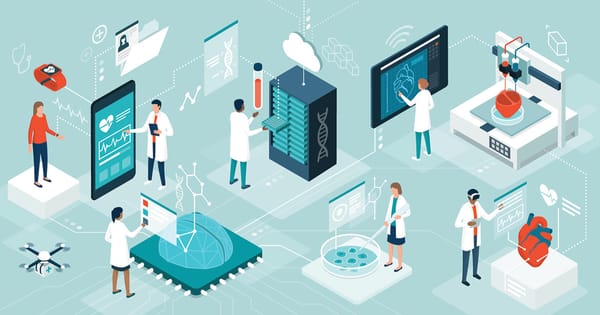We caught up with Ahmed Serag, Global Director, Data Science & AI Innovation at Novartis, to ask him some questions about his presentation at the AI Accelerator Festival.
His talk is available to watch now OnDemand - AI Innovation in Healthcare: Making the Invisible Visible
We chatted with Ahmed to discuss his presentation, what excites him about AI, the biggest challenges for organizations adopting AI and the best projects he's worked on.
So, want learn more about his talk? Keep reading!
Q: To kick things off, it would be great to learn a bit more about your background. What led you to get into your chosen area of AI?
A: I’m currently Director of Data Science & AI Innovation at Novartis, building new technologies using data and AI to develop transformative medicines faster and more cost-effectively for patients worldwide. I started my journey as a biomedical engineer where I got really interested in the advances that improve human health and healthcare. Then, I underwent a PhD in Computer Science at Imperial College London, developing AI tools and algorithms for medical and healthcare problems. I worked for a long time at Philips, building AI technology in a healthcare setting for various specializations including radiology and pathology. Over the course of that time, I started to realise that even though the technology was maturing and it was really doing well in many of the problems that we are trying to tackle, they are so many other elements that were making it difficult to get that technology adopted in a clinical setting. And because I was always motivated by impact, I realised the importance of innovation and how it can enable healthcare technology providers and pharmaceutical manufacturers to bring benefits from AI technology to patients worldwide more rapidly.
Q: What excites you the most about AI within your respected industry? What advancements do you see disrupting/having an impact on the areas you work in?
A: AI has a significant role to play in healthcare and improving patients’ overall journey. I am excited about precision medicine, an approach for disease treatment and prevention that takes into account individual variability in genes, environment, and lifestyle for each person. AI is the primary capability behind the development of precision medicine, and it is widely agreed to be a sorely needed advance in care. I am also very excited about the impact of AI in diagnosis and treatment, and I expect AI will ultimately master that domain. For example, given the rapid advances in AI for imaging analysis, it seems likely that most radiology and pathology images will be examined at some point by a machine. This will provide decision support to clinicians seeking to find the best diagnosis and treatment for patients.
Q: What is the biggest challenge within your respected industry for organizations adopting AI?
A: The biggest challenge to AI in the healthcare domain is not whether the technologies will be capable enough to be useful, but rather ensuring their adoption in daily clinical practice. For widespread adoption to happen, AI systems must be approved by regulators, standardised to a sufficient degree that similar products work in a similar manner, integrated with clinical systems, taught to clinicians, updated regularly, and paid for by public or private payer organisations. These challenges will ultimately be overcome, but they will take much longer to do so than it will take for the technologies themselves to mature.
Q: What is the most exciting project you’ve personally worked on within the last 3 years?
A: It is very hard to choose one project in particular. In healthcare and medicine, everything you work on is about improving peoples’ lives. For example, at Philips I have worked on building automated systems to support clinicians in detecting and differentiating types of dementia for more accurate diagnoses and treatment of patients, and also systems for detection and classification of cancer from microscopic images. I am personally proud about these research projects because they are now commercialised and are considered as a breakthrough in medical diagnostics. But I can’t deny that I worked on other interesting projects. For example, during my PhD, I developed AI algorithms for computer aided diagnosis of neurological damage to improve care for infants born prematurely. I think it is really hard for me to choose only one project!
Q: What are you currently working on? What departments are involved?
A: Traditionally, pharmaceutical companies have had to devote $2.5 billion and 12 years of to bring a single therapy to market. The stark reality is that only 1 out of 10,000 compounds makes it through clinical trials and into the hands of patients. As part of the AI Innovation team at Novartis, and in collaboration with Microsoft, we are using the power of data and AI to tackle some of the biggest challenges in the life sciences to accelerate discoveries and the development of transformative medicines for patients worldwide.
Q: What can our audience expect from your session at the AI Accelerator Festival?
A: AI based systems in healthcare and medicine are already improving the accuracy and efficiency of diagnosis and treatment. And with more advanced data processing technologies, AI can make the invisible visible, for example, by recognising complex tumours, diseases, and changes. In my talk, I will focus on the role of AI in healthcare and medicine, latest innovations across various specializations, and biggest challenges.



 Follow us on LinkedIn
Follow us on LinkedIn


